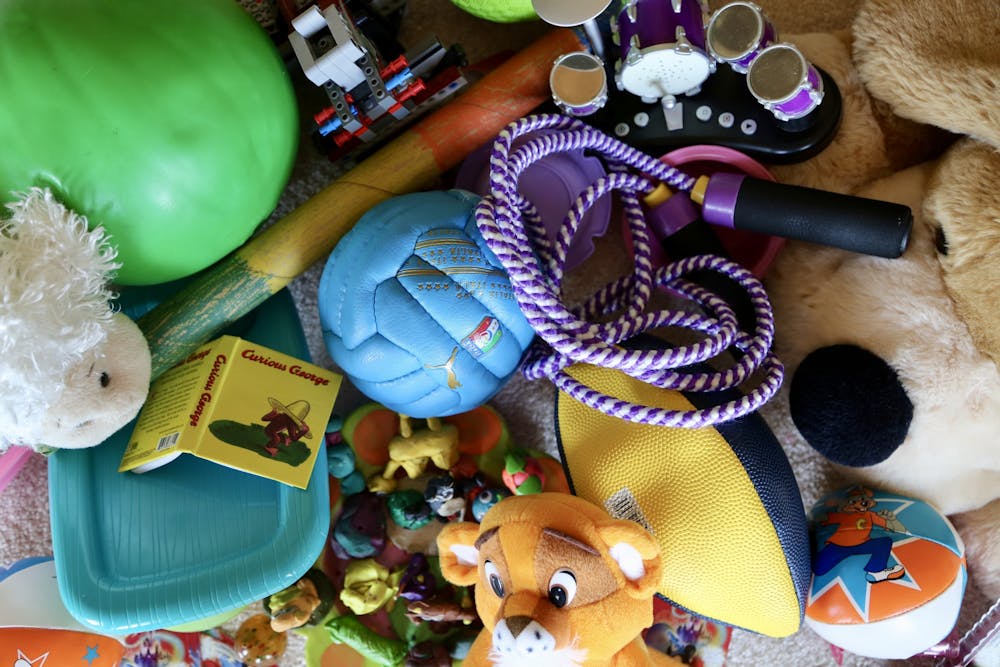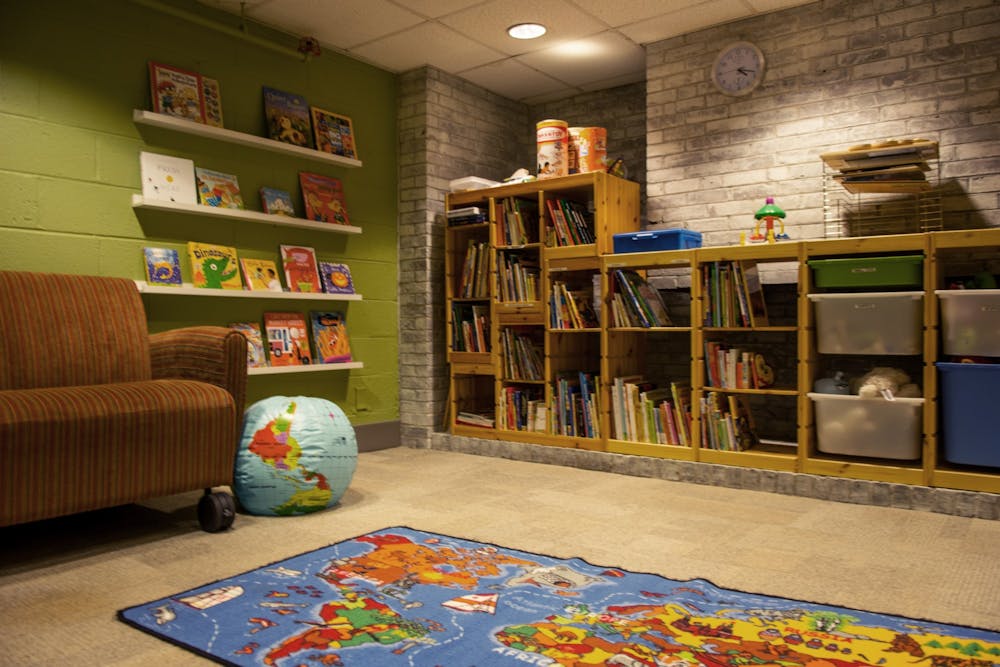
While the COVID-19 Childcare Grant will support faculty, staff, and postdoctoral trainees, it excludes undergraduate and graduate students.
Credit: Maria MuradPenn announced a new COVID-19 Childcare Grant to support faculty, staff, and postdoctoral trainees forced to navigate a remote semester balancing professional and parental responsibilities. But some members of the Penn community say the grant is, in many cases, not enough, and excludes undergraduate and graduate students with children.
The grant, effective Sept. 15, will provide active, full-time Penn employees or postdoctoral trainees eligible for benefits with reimbursements up to $2,000 per household for childcare expenses incurred at a childcare facility or at home during the 2020-2021 academic year. Applicants must have a yearly Penn salary of $100,000 or less, have at least one child younger than 11 years old or 11 to 18 years old with a disability, and confirm that COVID-19 disrupted their usual childcare arrangements.
While the $2000-grant drew appreciation from eligible staff and faculty, some noted it pales in comparison to the state of Pennsylvania’s average annual childcare cost of $11,842, and Penn Children Center's annual cost for five-day-a-week programming, which ranges from $11,000 to $28,000. Ph.D. students who also have to manage their professional and childcare responsibilities expressed frustration with their ineligibility for the grant.
Postdoctoral trainees have earned a Ph.D. and hold a temporary position at an institution to gain skills and experience that will prepare them for their academic career.
The grant's announcement comes just three weeks after the Gender, Sexuality, and Women’s Studies Department sent Penn President Amy Gutmann and Provost Wendell Pritchett a list of 10 recommendations for University administration to help alleviate pressure from all members of the Penn community, particularly those with children, caused by the shift to remote teaching.
"We have been laboring at home, using our own computers and other office supplies, with our children, elderly parents, and other dependents present, in the ultimate entanglement of work and home life," the letter read. "Many of us do not feel that our material conditions have been sufficiently acknowledged, nor has our plight been addressed in any meaningful way, by the University."
The letter, which garnered 239 signatures, featured a childcare fund for graduate students, faculty, and staff as its number one recommendation. GSWS previously released a statement in May pointing to the disproportionate effect of COVID-related professional disruptions on women, citing systemic class, racial, and gendered inequities in the distribution of childcare burdens.
It is not clear, however, whether Penn’s grant was in direct response to GSWS’ recommendations, given that the only response GSWS heard from administration was an acknowledgement that the recommendations were received, Associate Director of GSWS Gwendolyn Beetham said.
Beetham, who has a 2.5-year-old, said the list of recommendations — ranging from allocating University funds to childcare centers, to paying Payment in Lieu of Taxes to the Philadelphia School District — was a result of widespread collaboration with faculty and researchers in GSWS as well as other Penn undergraduate and graduate schools. The department also communicated with faculty at peer institutions such as Harvard University, Georgetown University, and Vanderbilt University who were advocating for similar solutions from their respective administrations.
“Childcare on university campuses is not a new issue. This is something that folks have been talking about for a long time," Beetham said. “The current crisis has really thrown this into relief, so these problems that everybody has been struggling with for a long time on an individual level, are now really being seen as a collective problem — but there was always a collective problem.”
Associate professor of political science Dawn Teele, who is a mother of two and signee of GSWS’ letter, acknowledged the University’s “massive budget shortfalls,” citing lower enrollment and the tuition freeze. She wished, however, that Penn made a University-wide effort to collect information on faculty childcare needs in order to make accommodations that would lighten employees’ workloads accordingly.
“I wish that it wasn't just up to each department to figure out how to support people, but there was a University effort to collect information, reallocate, and to pitch in with this problem,” she said. “Having children, although it is a personal decision, is also a public one. Individuals bear the costs and individuals bear many of the pleasures of children, but it is a society-wide benefit.”
Despite the grant, Teele added that a larger concern of hers is accommodating childcare needs for staff who find themselves in a vulnerable position amid a nationwide trend in involuntary university furloughs. She said that many staff members feel hesitant to speak out for fear of losing their jobs, noting that some did not even feel comfortable signing GSWS' letter of recommendations.
Ph.D. students, who are barred from Penn's childcare grant, expressed their own concerns with managing their professional and childcare responsibilities.
"I was disappointed that there wasn't even a mention [of graduate student parents]," said second-year Genetics Ph.D. candidate Rona Wilf, who has a 2.5-year-old child. "It's very hard, financially, and it's hard to organize and have someone advocate for us."

The Family Center at Penn serves students and postdoctoral trainees, but not faculty or staff.
When asked why undergraduate and graduate students were not included, Senior Human Resources Communications Specialist Stephanie Brown wrote in an email to The Daily Pennsylvanian: "There are other resources and supports available to students with children, and The Family Center at Penn is the campus hub for those services."
Jessica Bolker, director of the Family Center, said there are over 1,500 student parents on campus, and the Family Center serves approximately 650 members — 0.3% of whom are undergraduate students, 60% of whom are graduate students, and 40% of whom are postdoctoral trainees. The Family Center, which only serves students and postdoctoral trainees, and not faculty or staff, has two of its own grants specifically for Ph.D. student parents.
Wilf said she found great support in the Family Center but wished for more acknowledgement and support from the Penn administration, which she said is lacking based on this new COVID-19 Childcare Grant.
Like Wilf, Maja Sidzinska, a second-year Philosophy Ph.D. student and mother of a five-year-old, commended the Family Center on its resources, but similarly called on the University to do more.
"The Penn administration could come up with a comprehensive, systematic policy that relieves graduate students of having to make their own arrangements with faculty," she said. "It could, for instance, offer some form of dependent leave, as it offers leave for those who have contracted COVID-19."
She said, however, she feels unable to further advocate for more childcare support due to the risks associated with more calls for action.
"The sad irony is that the louder any student calls for changes, the more of a 'problematic' student they are seen to be relative to their peers, so there are risks involved in keeping up pressure on various issues," she said.
Beetham said despite the shortcomings of the grant, she is grateful for the University's support, and said GSWS will continue to advocate for all parents in the Penn community. The department is currently preparing a follow-up letter to University administration to show appreciation for the grant and re-emphasize some of its other recommendations in the previous letter.
"I know a lot of parents have really been having a hard time, so it is great that we have this kind of support with the grant, but also any additional support we can get would be really great," she said.
The Daily Pennsylvanian is an independent, student-run newspaper. Please consider making a donation to support the coverage that shapes the University. Your generosity ensures a future of strong journalism at Penn.
Donate







